Related Content

Campus Antisemitism Surges Amid Encampments and Related Protests at Columbia and Other U.S. Colleges



Introduction
As university encampments and other forms of student protests against Israel capture attention across the United States, protest organizers have made it clear that, on the majority of campuses, their goals go far beyond urging their universities to call for a ceasefire in the Israel-Hamas war or to denounce Israeli government policies.
The ADL Center on Extremism analyzed statements published by the organizers of more than 130 university encampments nationwide between mid-April and early May 2024 and determined that, at more than two thirds of these encampments, the protesters’ demands included calls for universities to enact policies that would directly disrupt the lives and studies of Jewish students and faculty and, in some cases, even exclude them from campus life. If acted upon, these wide-ranging and often extreme demands would fundamentally alter Jewish life on college campuses by dismantling or severely limiting essential Jewish communal and academic infrastructure and restricting who can freely exist in these spaces.
These demands are not limited to published statements; they have also played out on the ground on many campuses in recent months. For example, anti-Israel protesters have prohibited Jewish students from accessing public areas on campus because they identify as “Zionists,” chanted slogans like “the Zionists have got to go” and disrupted religious activities or other events hosted by Jewish organizations.
The harmful, sometimes bigoted demands and statements of many of the anti-Israel campus protesters cannot be dismissed as the product of fringe or rogue agitators; these extreme demands are at the heart of the anti-Israel movement and a fundamental element of the ongoing student encampment and protest activities.
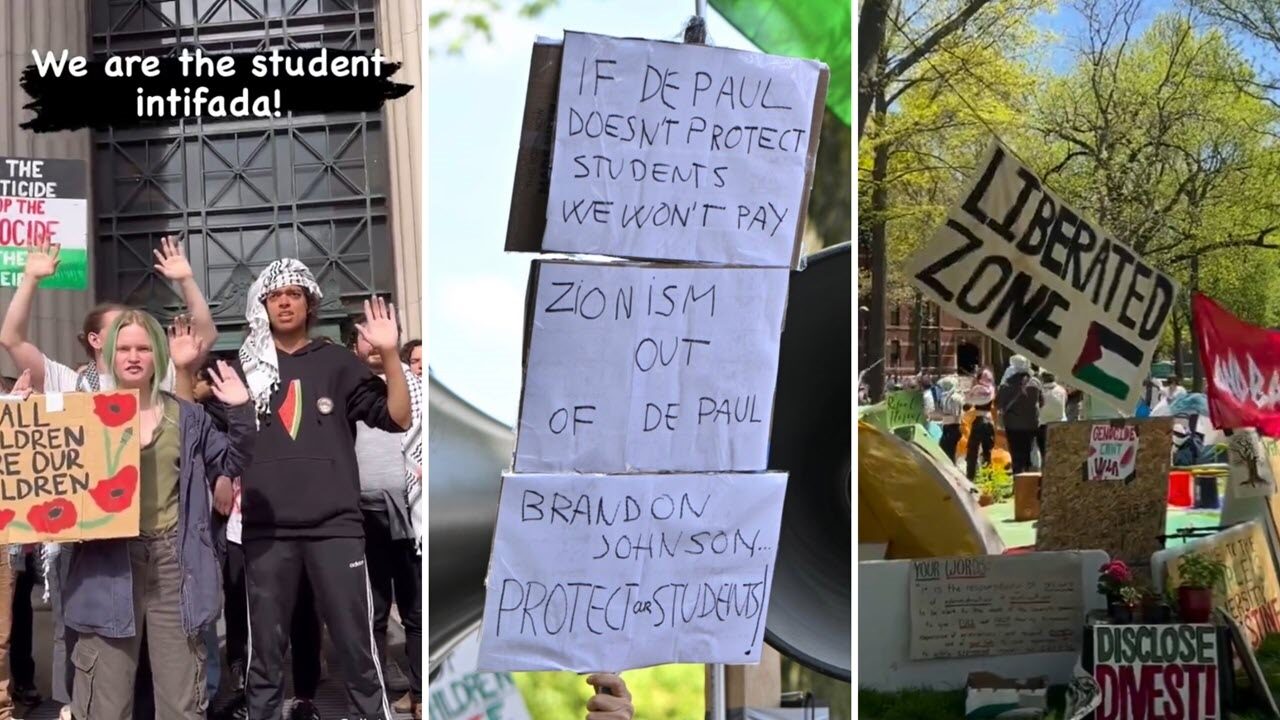
This composite image shows student encampment activities at MIT, DePaul University, and Yale, from left to right, in May 2024.
Background
Since Hamas’s October 7, 2023 terrorist attack against Israel, college campuses have been frequent sites for anti-Israel demonstrations as student protesters seek to pressure university administrations into enacting specific demands. Since mid-April 2024 specifically, students across the United States have launched encampments, sit-ins and other forms of protest in connection with the Students for Justice in Palestine (SJP)-led “Popular University for Gaza” movement.
In their published statements and on-the-ground activities in recent months, student protesters — including those affiliated with Students for Justice in Palestine (SJP), Students for a Democratic Society (SDS) and other groups — have frequently called for the exclusion of so-called Zionist individuals, organizations, and programming from campus. If implemented, these calls to ban “Zionists” would in effect prohibit most Jewish students, faculty, staff and other individuals from campus, since the vast majority of Jewish people identify in some way with Zionism (support for Israel’s existence in the Jewish ancestral homeland).
The use of so-called “anti-normalization” rhetoric and strategies has been promoted for years by some anti-Zionist activists. The anti-normalization approach calls for the complete rejection of any cooperation or association with individuals and organizations who support or even simply accept Israel’s existence as a state.
This type of antisemitic and extreme anti-Zionist rhetoric — which has been documented by ADL on colleges campuses long before October 7 — has surged in recent months, particularly as the student encampments spread nationwide.
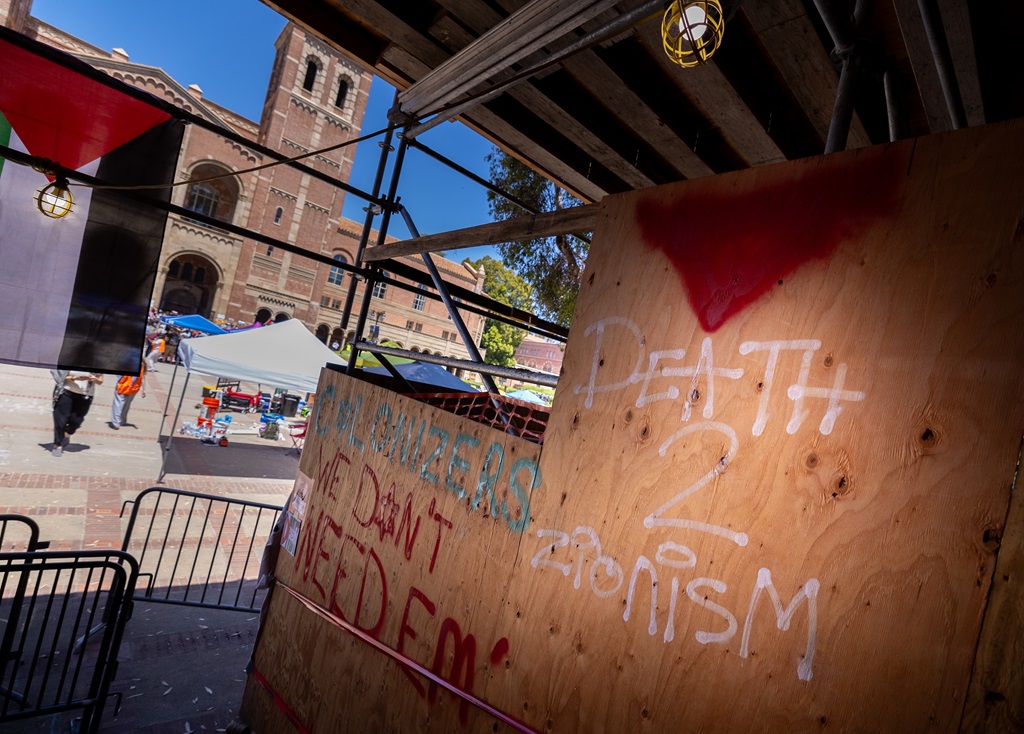
(Brian van der Brug / Los Angeles Times via Getty Images)
Graffiti reading "Death 2 Zionism" is seen outside the Powell Library on the UCLA campus where anti-Israel demonstrators set up an encampment on Monday, April 29, 2024 in Los Angeles, CA. (Brian van der Brug / Los Angeles Times via Getty Images)
In their published lists of demands, anti-Israel student organizers have called upon universities to cut ties with organizations like Hillel International, the premier Jewish on-campus organization whose main aim is to support Jewish life; to divest from charitable foundations that fund Jewish academic research and life on campus; and to ban “Zionist” speakers from campus. Some statements by anti-Israeli encampment protesters have echoed classic antisemitic tropes about supposed Jewish power and financial control by attacking “Zionist” trustees and donors and their alleged influence on university affairs.
Organizers have called for U.S. colleges to permanently sever ties with universities, research institutions and other academic programs in Israel, echoing demands long promoted by the U.S. Campaign for the Academic Boycott of Israel (USACBI) and others in the Boycott, Divestment and Sanctions (BDS) movement.
Notably, some U.S. anti-Israel student protesters have taken these common BDS directives even further by calling for individual Zionists and Israelis to be banned and boycotted — breaking with USACBI guidelines that specifically advocate for “the boycott of Israeli institutions, not individuals” and which “[reject] on principle boycotts of individuals based on their identity…or opinion.”
Alarmingly, some student protesters have punctuated their official demands with even more extreme language in their chants, signs, or other commentary, such as calling for “death” to Zionism and Zionists. Many involved in the current anti-Israel student protest movement have adopted the moniker of the “Student Intifada” — a phrase that calls to mind two historical periods in the late 1980s and early 2000s during which Palestinian terrorists committed indiscriminate acts of violence against Israelis, resulting in the deaths of more than 1,000 people.
Other troubling rhetoric has included calls for Zionism and Zionists to be publicly ostracized and eradicated. Student groups have endorsed so-called “escalation” of tactics aimed at dismantling “Zionist” institutions.
Targeting Jewish On-Campus Organizations and Programming
Even before the encampment trend, anti-Israel protesters had increasingly organized actions against Hillel, Chabad, and other Jewish organizations on college campuses in the months since October 7. At the University of California, Santa Cruz (UCSC), for example, anti-Israel students and faculty protested a “Jewish Unity Walk” on March 14 hosted by the school’s chapters of Hillel, Chabad, Alpha Epsilon Pi, and StandWithUs. Protester organizers stated: “Let’s make it clear…zionism [sic] is not welcome on our campus.”
UCSC protesters, including the university’s SJP chapter and other groups, again explicitly called out Hillel when they launched their campus encampment on May 1. Referencing Hillel and multiple prominent San Francisco-based Jewish charities by name, the student protesters demanded that the university “cut ties UC wide with all zionist [sic] institutions--- including study abroad programs, fellowships, seminars, research collaborations, and universities. Cut ties with the Hellen Diller foundation, Koret foundation, Israel institute, and Hillel International.”
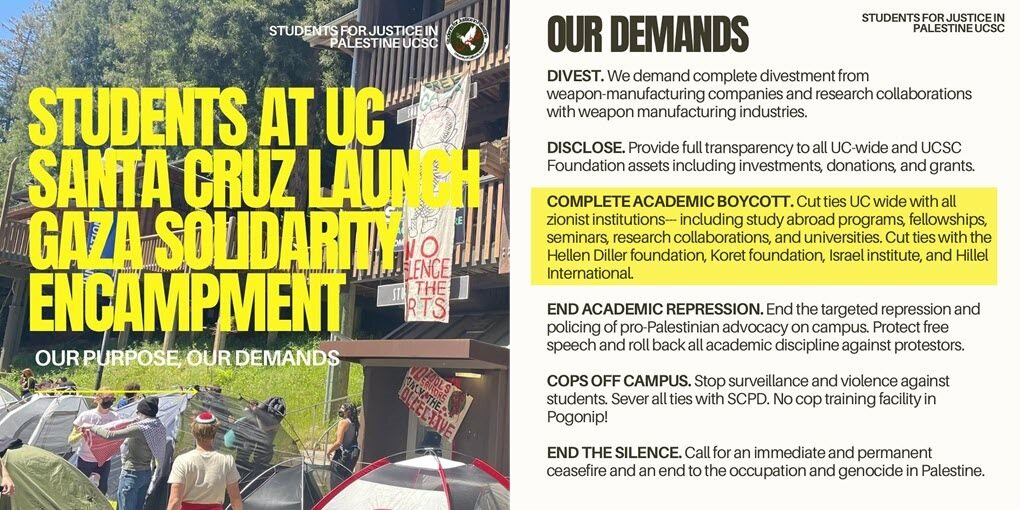
Social media posts from the SJP chapter at UC Santa Cruz in Santa Cruz, CA, advertising their encampment and their list of demands to the university.
The SJP chapter at the School of Visual Arts in New York, NY released a similar set of demands when they began a sit-in at the university’s administrative building on May 2. Among the demands, which were posted online and displayed on a poster at the sit-in, was that the university “cut ties with Hillel International and any other Zionist institutions.” The SJP statement disparaged Hillel as “an explicitly Zionist club” and attacked the organization for facilitating Jewish students’ travel to Israel via the Birthright program. In another published statement, sit-in organizers reaffirmed: “We demand that the school doesn’t foster a space for zionist [sic] organizations such as Hillel.”
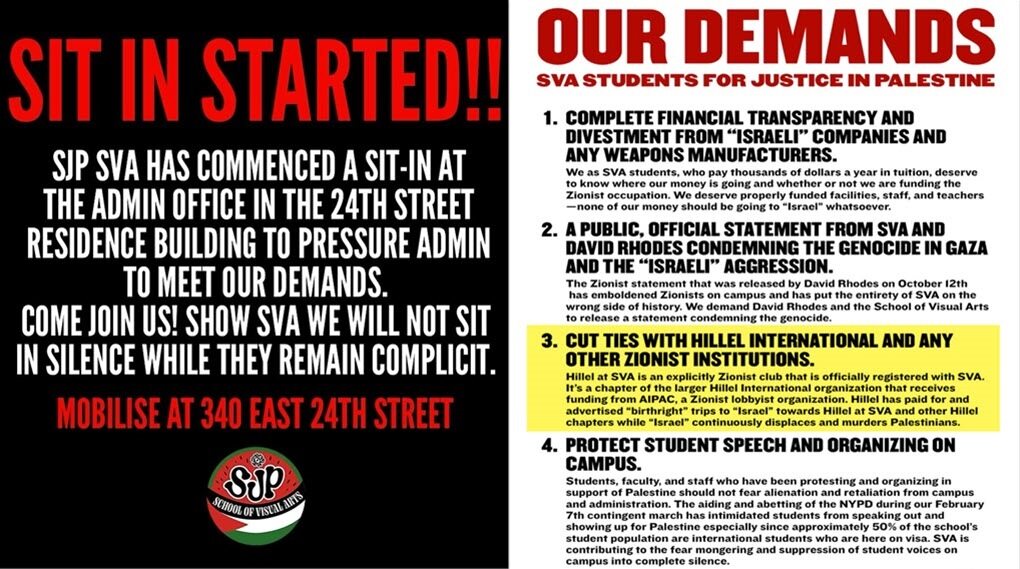
Social media posts from the SJP chapter at the School of Visual Arts in New York, NY, advertising their sit-in and their list of demands to the university.
Student protesters at Georgia Tech in Atlanta, GA held a “Divest from Death Emergency Rally” on campus on March 28 at which they displayed materials that suggested Hillel is involved in a so-called scheme of “Fabricating and Feeding the Cult of Zionism.”
On March 8, protesters disrupted an on-campus, Hillel-hosted Shabbat event at Florida International University in Miami, FL, preventing Jewish students from freely engaging in religious observances. Protesters were eventually removed from the building, but remained outside the exits, with Jewish students reporting that they were harassed and intimidated as they left the Shabbat event.
At Gallaudet University in Washington, DC on February 29, anti-Israel students protested a Hillel-hosted event that was sponsored by the university’s Division of Equity, Diversity, and Inclusive Excellence. Protesters stood outside the room on campus where the event — an “Ask Me Anything” session with a deaf rabbi who lives in Israel — was taking place, chanting slogans like “We want justice you say how; Zionists off our campus now!”
A protest leader affiliated with Maryland 2 Palestine told the crowd outside the Gallaudet event: “We have a responsibility to plan more protests, to show up at every disgusting Hillel event!” That same speaker added, “I don’t have the ability to be friends with Zionists…There’s no neutrality here. There’s no two sides. There’s one side — one right side — and one wrong side. And all of you here are on the right side. Everyone who’s hiding in there [indicating the room in which the Hillel event was taking place] is on the wrong side.” As individuals who had attended the Hillel event left the room, protesters harassed them, shouting “Shame on you!”
Other on-campus Jewish and so-called Zionist organizations and initiatives have been targeted as well. At Sonoma State University in Rohnert Park, CA, encampment organizers affiliated with the school’s SJP chapter made similar demands, calling on the university to “divest from all donors and funds that support and profit from the occupation in Palestine, such as programs like KORET.” The Koret Foundation is a Jewish philanthropic organization that provides grants to a wide range of organizations, including funding student research and creative projects at Sonoma State.
At Princeton University in New Jersey, organizers affiliated with the Princeton Israeli Apartheid Divest group and the New Jersey chapter of American Muslims for Palestine (AMP) began an encampment on April 25 and demanded that the university end its “relationship with the Tikvah Fund,” a U.S.-based Jewish philanthropic foundation. The foundation sponsors the Tikvah Project on Jewish Thought at Princeton’s Perelman Institute for Judaic Studies, a program that “supports teaching, research, and publication on Jewish thought.”
Additional Calls for the Explicit Exclusion of Zionist Individuals and Organizations
In addition to the direct attacks on Hillel and other Jewish organizations or programming on college campuses, student protesters have also made calls for the exclusion of “Zionist” individuals and organizations more broadly — from banning “Zionists” from serving on universities’ governing boards to prohibiting “Zionist” speakers from coming to campus to removing Israeli faculty from teaching certain courses and more. Protesters have promoted these demands in their published online statements and in their in-person comments at encampments and protests.
At the School of the Art Institute of Chicago in Chicago, IL, where an encampment was launched on May 4, organizers demanded that the school “divest from all entities and individuals financially supporting the Zionist occupation of Palestine, including: A Total Removal of any programs within the institute that legitimize the Zionist occupation of Palestine.” At Portland State University in Portland, OR, student encampment organizers with the SJP-affiliated Students United for Palestinian Equal Rights (SUPER) group made similar anti-normalization demands on May 2, calling for the university to “divest from all Zionist entities on campus.”
SJP and affiliated groups at the University of California, Irvine, who began their encampment on April 29, demanded that the university “end all zionist [sic] university programs and collaborations with zionist [sic] organizations and individuals.”
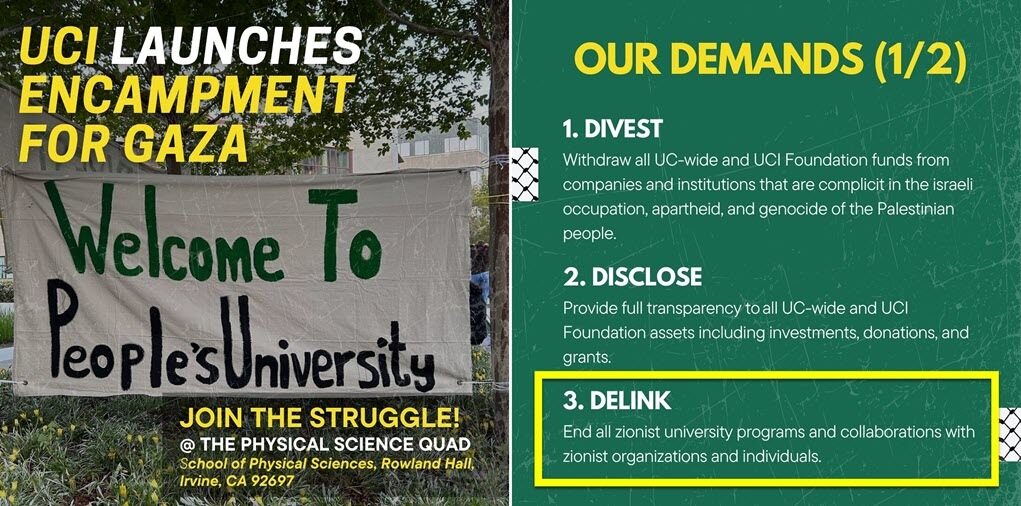
Social media posts from SJP and their co-sponsors of the encampment at UC Irvine in Irvine, CA, advertising their action and their list of demands to the university.
In New York, NY, encampment organizers with SJP at The New School published their demands upon establishing an encampment on April 21: “We reject normalized collaboration with any educational and cultural institutions of the genocidal apartheid State of Israel, which are inherently complicit in the legitimization of the occupation of Palestine and the oppression of the Palestinian people.”
The “Points of Unity” of The New School encampment opened with a statement affirming their anti-Zionism and their belief that “any forms of resistance against the Zionist occupation” are legitimate: “We are anti-zionists [sic]. Zionism is a settler-colonial white-supremacist ideology built on the genocide and dispossession of the Palestinian people. We reject all efforts to normalize zionist [sic] institutions and organizations.”

Social media posts from SJP and their co-sponsors of the encampment at The New School in New York, NY, advertising their action and their “Points of Unity.”
Nearby, SJP-affiliated encampment organizers at the Fashion Institute of Technology in New York, NY, used identical language about “anti-Zionism” and “resistance” in their own “Points of Unity” published at the start of their encampment on April 25. At Fordham University in New York, NY, student encampment organizers demanded “an end to the support, ignorance, and prejudicial rhetoric that maintains Zionism at our university.”
At a May 2 protest in Denver organized by the local SDS chapter and the Colorado Palestine Coalition held in support of the encampment on the Auraria Campus (home to University of Colorado Denver, Community College of Denver, and Metropolitan State University of Denver), attendees chanted: “No Justice, no peace, no Zionists on Denver streets.”
At California State University, Los Angeles (CSULA), SJP-affiliated encampment organizers demanded that the university boycott “any partnership with institutions, universities, and organizations that invest in, support, and legitimize the zionist [sic] regime” and called on the university to express implicit support for terrorism by defending “the right to resist the zionist [sic] occupation by all means necessary.” The organizers further wrote: “WE demand a fully-funded, free CSULA and CSU system that is not beholden to zionist [sic] and imperialist private donors.”
SJP encampment organizers at the University at Albany — part of the State University of New York (SUNY) system — similarly demanded “a fully-funded free SUNY that is not beholden to Zionist and imperialist donors or trustees.” Organizers of the City University of New York (CUNY) encampment in New York, NY mirrored this language in their demands and further called on the university to “ban all academic trips to the Zionist state; encompassing- birthright, Fulbright, and perspective trips. Cancel all forms of cooperation with Zionist academic institutions, including events, activities, agreements, and research collaborations.”
Students at DePaul University in Chicago, IL established their encampment on April 30, publishing a list of demands featuring explicit anti-normalization language. The statement called for the removal of “Zionists” from the university’s Board of Trustees, effectively calling for the removal of Jewish people from the university’s governing body: “No Zionists determining where our tuition money is going — removal [of] individuals with ties to Israel from Board of Trustees.”
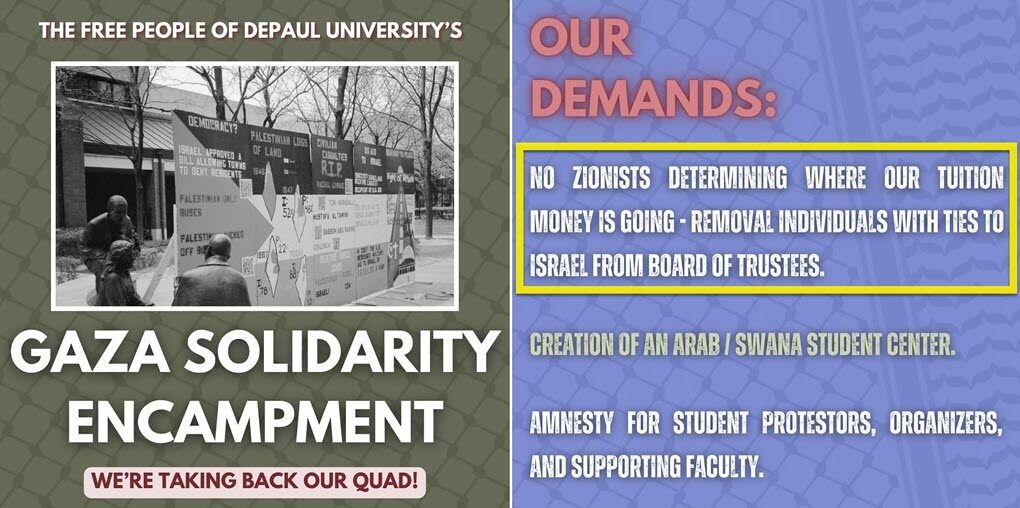
Social media posts from the Divestment Coalition Encampment at DePaul University in Chicago, IL, advertising their encampment and their list of demands to the university.
So-called “Zionist” donors were also protested at the City University of New York (CUNY), Hunter College in New York, NY, on February 28. Anti-Israel protesters held a rally declaring “Zionist Donors and Financiers Out of Jewish Campus Life.” Protesters gathered outside the university and chanted: “We say no to genocide, Jews on campus pick a side!”
At Evergreen State College in Olympia, WA, encampment protesters made multiple anti-normalization statements and demands when they began their action on April 23, declaring: “REJECT colonial feminism, ‘liberal Zionism’ seeking Palestinian submission, and any notion that DEI initiatives should include the voices and perspectives of zionists [sic].” Encampment organizers also endorsed the Palestinian thawabit, a set of principles often promoted by anti-normalization activists that includes calls to “denounce normalization in all its forms” and “support resistance against the zionist [sic] movement by any means necessary.”
Also in Washington state, a coalition of encampment organizers that included local chapters of SDS, Democratic Socialists of America (DSA), and Freedom Road Socialist Organization (FRSO) made similar demands at the University of Puget Sound. They called for the university to “cut all ties with Zionist Academic Engagement Network” and to “recognize the thawabit.”
The Palestine Solidarity Committee and Jewish Voice for Peace (JVP) chapters at Indiana University in Bloomington, IN also referenced the thawabit in their published statement when they launched an encampment on April 25, asserting “we refuse normalization” and endorsing “the right of colonized people to resist against occupation.”
At George Washington University (GWU) in Washington, DC, protesters at an event on May 2 held by GWU Student Coalition for Palestine, Palestinian Youth Movement (PYM) DMV, Party for Socialism and Liberation (PSL) and DMV Student Coalition for Palestine chanted: “Say it loud, say it clear, we don’t want no Zionists here.” One attendee yelled at counter-protesters, “We don’t want no rats here,” playing into a historic antisemitic trope equating Jews with rodents. At the DMV Gaza Solidarity Encampment hosted on the GWU campus, protesters displayed a banner that read: “Zionism is Fascism; Colonizers Out of DC.”
Howard University student organizers, co-sponsors of the encampment on the GWU campus, demanded in a post published on April 27 that their university “ban all individuals who are complicit in Israel’s colonization of Palestine from coming to campus to speak to students, faculty, and staff.” They also demanded that Howard “release a formal public statement in total solidarity with Palestinian students and Palestinian Resistance.”
Student organizers at the University of Maryland, Baltimore County, who were co-sponsoring that same GWU encampment, demanded that their university “remove any Israeli faculty member teaching Political Science courses on Deterring Terrorism, the Dynamics of the Arab-Israeli Conflict, and Middle East Security and Weapons of Mass Destruction.”
SDS-affiliated student encampment organizers at the University of North Florida in Jacksonville, FL called for a ban on Zionist speakers, writing “stop inviting Zionists [sic] speakers to give lectures on campus!” At Binghamton University, a SUNY-affiliated institution in Binghamton, NY, encampment organizers demanded the “permanent dissolution of all partnerships and affiliations with Israeli universities and pro-Israeli academic institutions.”
At the Ohio State University encampment in Columbus, OH — led by Ohio State students and co-sponsored by students from nearby Denison University, Miami University, University of Cincinnati and University of Toledo — demands from the SJP organizers included: “Cut ties with ‘israeli’ [sic] academic institutions, including but not limited to Ben Gurion University, Haifa University, Hebrew University, and Tel Aviv University. This encompasses study abroad programs, academic projects, research collaborations, international activities, awards, normalization projects, membership in ‘israeli’ [sic] associations, and publishing or refereeing for ‘israeli’ [sic] journals.”
Before they had established their own encampment, anti-Israel student protesters at Ohio State also held a protest on April 19 in support of the Columbia University encampment. At the protest, the students marched through campus chanting, “Hey hey, ho ho; the Zionists have got to go.”
Organizers of dozens of additional encampments have called for the end to their universities’ partnerships with Israeli universities and research institutions, as well as broader programs or “projects related in any way” to Israel. At the University of California, Riverside, SJP encampment organizers called for the school to “completely divest our tuition dollars from — and cut all institutional ties to — the zionist [sic] entity.”
SJP-affiliated encampment organizers at the University of California, Los Angeles (UCLA) similarly called for the university to “sever all UC-wide connections to israeli [sic] universities, including study abroad programs, fellowships, seminars and research collaborations, and UCLA’s Nazarian Center.” The Nazarian Center houses the university’s Israel Studies department and offers academic and community programming.
Before the UCLA encampment was disbanded on May 2, anti-Israel protesters were recorded restricting the movement of Jewish students on campus via checkpoints at the encampment’s entrances. In one video, encampment participants could be heard asking a Jewish student who was trying to use a walkway near one of the university libraries: “Are you a Zionist?” When the student replied affirmatively, they prevented him from passing and told him: “We don’t let Zionists in.”
Violent Anti-Zionist Language and Calls for the Destruction of Israel at University Encampments
Extreme, violent and anti-Zionist language has been a part of the encampment trend since its inception on U.S. college campuses in April. The official nationwide Students for Justice in Palestine “Popular University for Gaza” campaign was sparked in large part by the student encampment and related protests at Columbia University in New York, NY, where anti-Israel protests featured unapologetic calls to force Zionists off campus and destroy Zionism broadly.
At Columbia on April 17, a protester told the crowd: “We will never let up and we will never let down until Palestine is free, Zionism is destroyed, and Zionists start to hide like the Nazis.” Protesters also chanted slogans that demonized Zionists and Zionism, including: “Say it loud, say it clear; we don’t want no Zionists here” and “Free our prisoners, free them all; Zionism will fall.”
Similarly violent, threatening rhetoric has appeared at encampments and related protests since then. On May 4, student protesters at the Massachusetts Institute of Technology (MIT) encampment in Cambridge, MA chanted in Arabic: “From water to water [Jordan River to the Mediterranean Sea], death to Zionism!”
At the New York University (NYU) encampment in New York, NY, a poster was displayed that contained messages like: “Destroy Zionist business interests everywhere!” After the encampment was cleared out by law enforcement on May 3, hundreds of protesters gathered to support the encampment, chanting: “Israel will fall!” and “Zionism will fall!”
Online, the NYU Palestine Solidarity Coalition published a statement on May 7 that stated, “now more than ever we must escalate.” The statement read: “We will continue to intensify our actions until our demands are met, until the genocide ends, until the zionist [sic] entity crumbles, and until Palestine is free. We do not accept the crumbs that the University attempts to pacify us with.”
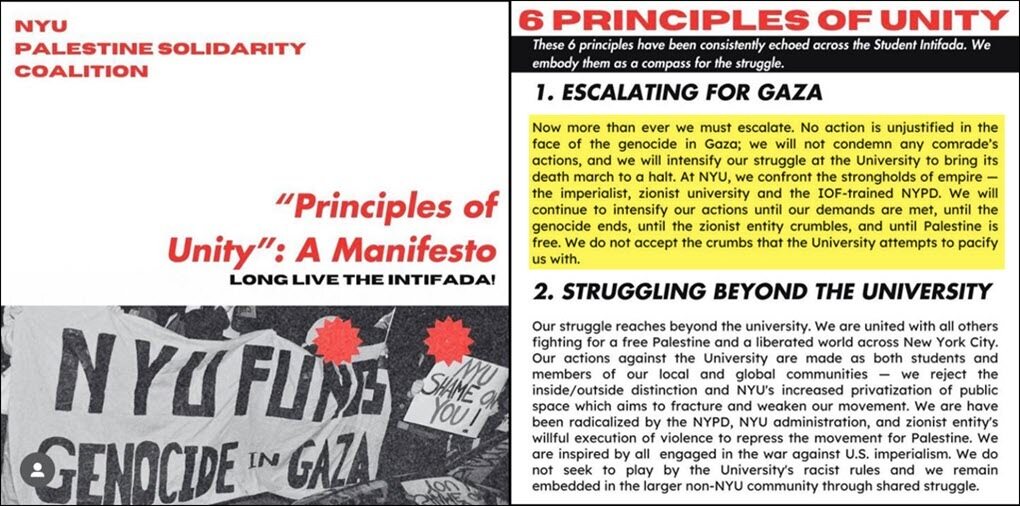
Social media posts from the New York University (NYU) Palestine Solidarity Coalition advocating for an escalation of tactics “until the zionist [sic] entity crumbles.”
The SJP chapter at the Fashion Institute of Technology in New York, NY posted a graphic on their Instagram account reading, in part: “Death to Zionism in every corner of this wretched world.” The message had originally appeared in a tweet from anti-Zionist activist Fatima Mohammed on May 1.
The SJP chapter and other members of the divestment coalition at California State University, Long Beach (CSULB) demanded in no uncertain terms that the university call for the elimination of Israel. In a published statement advertising a May 2 protest in support of the “People’s University” movement, the organizers demanded that the CSULB administration “call for the end of the settler colonial state of Israel.” At the May 2 protest, attendees held a sign reading “Zionists rot in hell” accompanied by a depiction of flames under the text.
At Pomona College in Claremont, CA, student organizers released their “Political Principles of Unity” upon launching their encampment on May 6. They called for the college to enact an academic boycott of Israeli institutions and also indicated their support for potential violent action to achieve their demands: “We reject the enemy’s moves from elimination to assimilation. We refuse to waste time seeking reconciliation and recognition from the administration, pigs, politicians, and press. We reject neo-liberal glorification of an empty ‘nonviolence.’”
On Instagram, the Georgia State University SJP chapter shared a pamphlet titled “FROM THE GATES: ESCALATE” from anti-Zionist group Palestine Action US that declares its mission of “disrupting and dismantling zionism [sic] and US imperialism” and that, in achieving this aim, "we will not disavow any actions taken to escalate the struggle, including militant direct actions.”
The Jewish Voice for Peace (JVP) chapter at Columbia University also commented on the original Palestine Action US post, writing: “FROM THE LAWNS AND PAST THE GATES: IT IS TIME TO ESCALATE.”









